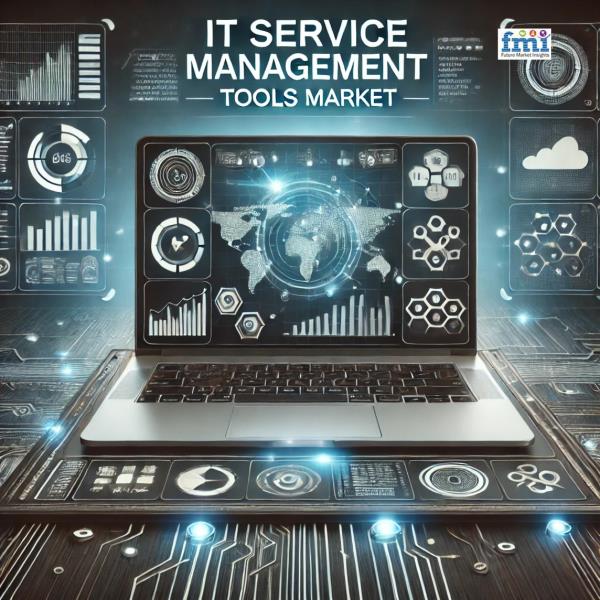IT Service Management (ITSM) refers to organizations' activities, processes, and strategies to design, deliver, manage, and improve IT services they provide to their customers or end-users. This service focuses on aligning IT services with the needs of the business and ensuring that IT infrastructure and services support the organization's goals and objectives.
NEWARK, DE / ACCESSWIRE / November 21, 2024 / The global IT Service Management tools market is projected to experience significant growth, reaching a valuation of USD 9,594.9 million in 2024. Driven by increasing adoption of digital solutions, the market is forecast to expand at a Compound Annual Growth Rate (CAGR) of 14.5% from 2024 to 2034, surpassing USD 37,079.4 million by 2034. This growth is attributed to businesses' heightened need for operational efficiency, automated service delivery, and robust IT governance in the digital age.
ITSM tools are essential in accelerating IT operations, improving incident management, and enhancing service delivery. They provide a structured framework for IT teams to align services with business goals, optimize resources, and reduce downtime. As organizations globally move towards cloud-based solutions and automation, the demand for ITSM tools is expanding, offering features like incident tracking, service request management, and proactive change management.
Key Drivers of Growth
Automation and AI Integration: Automation is becoming integral to ITSM tools, with platforms like ServiceNow and BMC Software incorporating AI for predictive analytics, incident resolution, and proactive problem management. Automation helps streamline workflows, reduce manual interventions, and improve service quality.
Cloud Adoption and Hybrid Work: Cloud-based ITSM solutions are gaining traction, with businesses moving toward scalable, flexible platforms. The increasing prevalence of hybrid and remote work models is driving the demand for cloud ITSM solutions to ensure seamless service delivery across distributed teams.
Focus on IT Governance and Compliance: Growing regulatory requirements such as GDPR and HIPAA are prompting businesses to adopt ITSM tools that help streamline compliance processes, automate risk management, and improve governance frameworks. Tools that offer auditing, compliance reporting, and data protection capabilities are in high demand.
Regional Insights into the IT Service Management Tools Market
Countries |
CAGR from 2024 to 2034 |
India |
16.9% |
China |
15.8% |
USA |
15.1% |
Germany |
14.2% |
Key Takeaways from theIT Service Management Tools Market
The global ITSM tools market is projected to reach USD 37.08 billion by 2034, growing at a 14.5% CAGR.
Cloud-based ITSM solutions will dominate the market, with 67.9% market share in 2024.
Automation and AI integration are reshaping ITSM tools, improving service efficiency and response times.
The rise of hybrid work models is driving increased demand for ITSM solutions to support remote teams.
Compliance with regulations like GDPR and HIPAA is a major driver for ITSM tool adoption.
The finance sector leads ITSM tool adoption, with 24.4% market share in 2024.
Legacy system integration remains a challenge, slowing down ITSM tool deployment in some sectors.

Prominent Drivers of the IT Service Management Tools Market
Digital Transformation: The ongoing shift towards digital technologies is driving the need for efficient IT service management solutions.
Regulatory Compliance: Stricter data protection and compliance regulations like GDPR and HIPAA are encouraging businesses to invest in ITSM tools for better governance and reporting.
Cybersecurity Concerns: Growing threats to cybersecurity are prompting organizations to adopt ITSM solutions that ensure secure, compliant IT operations.
Cost Efficiency: Cloud-based ITSM tools offer cost-effective solutions by reducing upfront investments and infrastructure maintenance costs.
Service Continuity: The increasing need to maintain high service uptime and availability is driving demand for tools that ensure reliable service delivery.
Incident and Problem Management: ITSM tools improve the management of incidents and problems, enhancing service recovery and reducing downtime.
Customer Experience: Organizations are leveraging ITSM solutions to enhance customer satisfaction through faster response times, self-service portals, and proactive problem-solving.
DevOps and Agile Methodologies: The adoption of DevOps and Agile frameworks is boosting demand for ITSM tools that support these collaborative, rapid service delivery models.
Service Desk Optimization: ITSM tools are streamlining service desk operations by automating workflows and providing real-time reporting for continuous improvement.
"Automation and the integration of AI and machine learning are reshaping the ITSM landscape. These technologies significantly improve service response times, optimize workflows, and ensure compliance with industry regulations" - says Sudip Saha Managing Director and Co-Founder at Future Market Insights.
Challenges Faced by IT Service Management Tools Market
Legacy System Integration: Many organizations face difficulties in integrating ITSM tools with existing legacy systems that lack modern APIs and compatible protocols, leading to complex deployments.
High Initial Costs: Despite the long-term benefits, the upfront costs associated with implementing ITSM tools, especially for on-premise solutions, can be a barrier for smaller businesses.
Customization Complexity: Tailoring ITSM solutions to meet specific business requirements or industry standards can be complex, requiring significant time and resources.
Data Synchronization Issues: Ensuring seamless data flow between ITSM tools and existing systems, especially in multi-cloud or hybrid environments, can lead to inaccuracies or delays in service delivery.
User Adoption Challenges: Resistance to change and the learning curve associated with new ITSM tools can hinder widespread user adoption across teams and departments.
Vendor Lock-In: Organizations may face challenges when trying to switch from one ITSM vendor to another due to proprietary technologies and limited interoperability, leading to long-term reliance on a single vendor.
Scalability Concerns: As businesses grow and their IT environments become more complex, ITSM tools may struggle to scale efficiently, especially when transitioning from smaller, cloud-based solutions to larger enterprise systems.
Security and Compliance Risks: With growing cybersecurity threats, businesses must ensure that their ITSM tools are fully secure and compliant with evolving regulations, which can increase implementation and maintenance efforts.
Maintaining Continuous Updates: Regular updates and improvements are necessary to keep ITSM tools aligned with the latest technological advancements and industry standards, but ensuring seamless updates without disrupting service is a key challenge.
Competitive Landscape of the IT Service Management Tools Market
The IT Service Management (ITSM) tools market is becoming increasingly competitive due to rapid technological advancements and evolving customer expectations. As organizations shift to hybrid work environments, the demand for flexible, scalable, and integrated ITSM solutions is rising. In response, vendors are enhancing their products with a variety of features designed to streamline workflows and enhance service delivery.
Additionally, the market is seeing a surge in partnerships and collaborations, enabling companies to leverage each other's strengths and broaden their service offerings. This trend is particularly noticeable as vendors seek to integrate ITSM tools with other enterprise software, aiming to provide a seamless user experience.
Niche players are further intensifying the competition by offering solutions tailored to specific industries or business needs. At the same time, price competition is becoming more prominent as vendors adopt value-based pricing models to appeal to cost-conscious organizations.
Recent Market Developments
In April 2024, SolarWinds launched an innovative tailored ITSM tool for enterprises. This will be a free online evaluation tool to unlock the full potential of ITSM solutions. It will help businesses to navigate their IT challenges to address potential issues and align ITSM with important business objectives.
In October 2023, Atlassian acquired AirTrack to help businesses for taking comprehensive approach to asset and configuration management. This combined offering with Jiva will track all crucial assets within their organization to reduce risks, costs and attack surfaces.
In January 2022, Atlassian acquired Percept.AI to expand frontline support in Jira service management. This will build on the company's existing AI and machine learning investments to support employees and customers at speed in a digital world and remote working world.
Leading Companies in the IT Service Management Tools Market
ServiceNow Inc.
BMC Software, Inc.
Accenture
ManageEngine (Zoho Corp.)
Zendesk Inc.
Cherwell Software
Ivanti
Hewlett Packard Enterprise
CA Technologies (Broadcom)
IBM Corporation
Axios Systems
EasyVista
Atlassian Corporation
Microsoft Corporation
LogMeIn, Inc
Access the Full Report IT Service Management Tools Market Trends and Projections Now!
https://www.futuremarketinsights.com/reports/it-service-management-tools-market
IT Service Management Tools Market Segmentation
By Solution:
The segment includes Software and Services.
By Deployment:
The segment is divided into Cloud-based and On-premises.
By Enterprise Size:
Small Offices (1-9 employees), Small Enterprises (10-99 employees), Medium-sized Enterprise (100-499 employees), Large Enterprises (500-999 employees) and Very Large Enterprises (1,000+ employees) are segmented in this category.
By Industry:
Finance, Manufacturing & Resources, Distribution Services, Services, Public Sector and Infrastructure are segmented in this category.
By Region:
A regional analysis has been carried out in key countries of North America, Latin America, East Asia, South Asia & Pacific Western Europe, Eastern Europe and Middle East and Africa (MEA).
Author
Sudip Saha is the managing director and co-founder at Future Market Insights, an award-winning market research and consulting firm. Sudip is committed to shaping the market research industry with credible solutions and constantly makes a buzz in the media with his thought leadership. His vast experience in market research and project management a consumer electronics will likely remain the leading end-use sector cross verticals in APAC, EMEA, and the Americas reflects his growth-oriented approach to clients.
He is a strong believer and proponent of innovation-based solutions, emphasizing customized solutions to meet one client's requirements at a time. His foresightedness and visionary approach recently got him recognized as the ‘Global Icon in Business Consulting' at the ET Inspiring Leaders Awards 2022.
Have a Look at the Related Reports of the Technology Domain:
Demand for Data Conversion Services to grow from USD 38.93 billion in 2022 to USD 540.8 billion by 2032, at a CAGR of 30.1%
The AI asset management tool market size is projected to grow at a CAGR of 10.60%, increasing from USD 8,296.10 million in 2024 to USD 30,291.60 million by 2034.
The asset integrity management market value is expected to grow from USD 26.8 billion in 2024 to USD 44.4 billion by 2034, with a CAGR of 5.2%.
The sales of workplace management tools is expected to grow from USD 11,583.6 million in 2023 to USD 65,046.7 million by 2033, with a CAGR of 18.8%.
The systems administration management tools market size was valued at USD 11,892.4 million in 2022 and is expected to reach USD 32,547 million by 2032, growing at a CAGR of 10.6%.
The demand for data management platforms is expected to reach USD 2,090.7 million in 2023 and grow at a CAGR of 12.3%, reaching USD 6,689.1 million by 2033.
The lead management market value is expected to grow from USD 2,558.2 million in 2022 to USD 12,342 million by 2032, with a CAGR of 17%.
The enterprise asset management market size is estimated to be valued at USD 4,717.07 million in 2024 and is projected to grow at a CAGR of 7%, reaching USD 9,279.09 million by 2034.
Sales of Consent Management Market is projected to surpass USD 2,550.8 million by 2034, growing at a CAGR of 10.8% from USD 917.2 million in 2024.
The demand for geomechanics software and services is estimated to be valued at USD 1,856.5 million in 2023 and is expected to grow at a CAGR of 6.7%, reaching USD 3,561.9 million by 2033.
About Future Market Insights (FMI)
Future Market Insights, Inc. (ESOMAR certified, recipient of the Stevie Award, and a member of the Greater New York Chamber of Commerce) offers profound insights into the driving factors that are boosting demand in the market. FMI stands as the leading global provider of market intelligence, advisory services, consulting, and events for the Packaging, Food and Beverage, Consumer Technology, Healthcare, Industrial, and Chemicals markets. With a vast team of over 400 analysts worldwide, FMI provides global, regional, and local expertise on diverse domains and industry trends across more than 110 countries.
Join us as we commemorate 10 years of delivering trusted market insights. Reflecting on a decade of achievements, we continue to lead with integrity, innovation, and expertise.
Contact FMI:
Future Market Insights Inc.
Christiana Corporate, 200 Continental Drive,
Suite 401, Newark, Delaware - 19713, USA
T: +1-347-918-3531
For Sales Enquiries: sales@futuremarketinsights.com
Website:https://www.futuremarketinsights.com
LinkedIn | Twitter | Blogs | YouTube
SOURCE: Future Market Insights Inc.
View the original press release on accesswire.com




